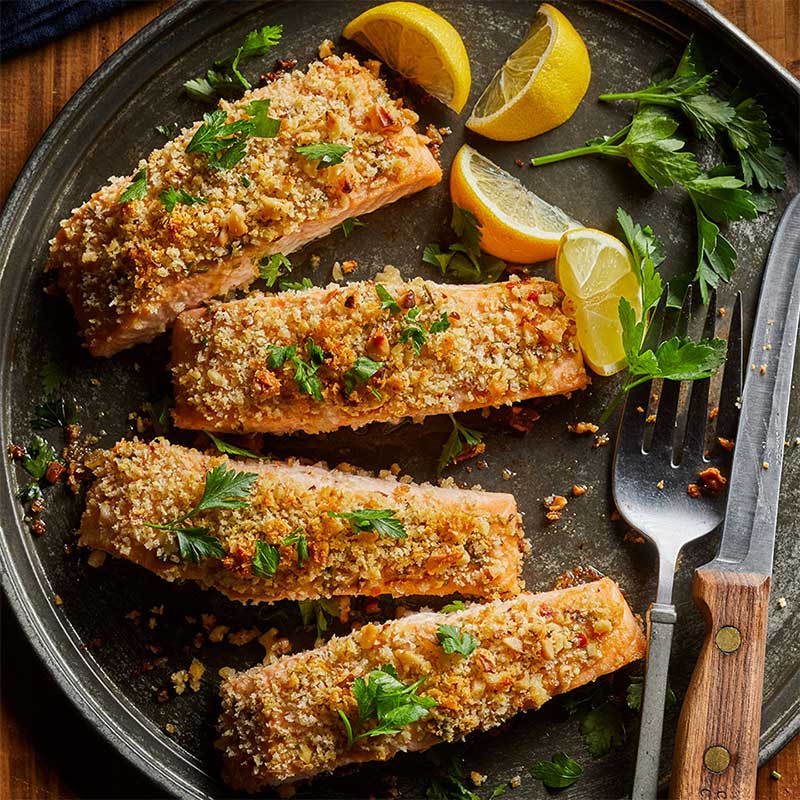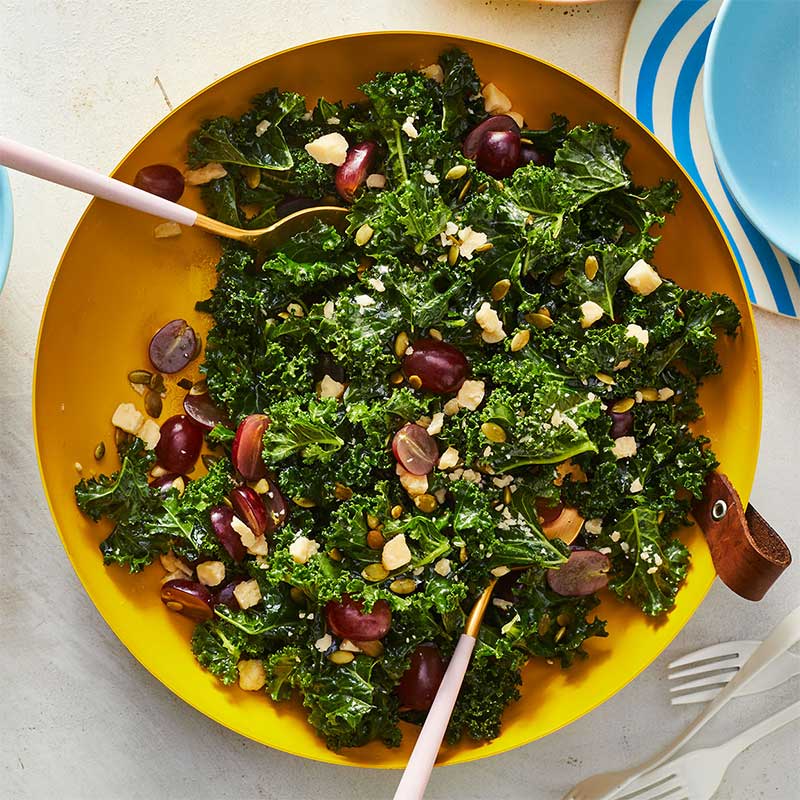With COVID-19 being a serious respiratory illness (and one that’s still running rampant), it’s no surprise that so many of us are suddenly working that much harder to keep our lungs healthy, strong and protected from intruders. No one food can protect you from the novel coronavirus (it’s washing your hands regularly, practicing social distancing and wearing a mask that will), but how does food relate to how well our lungs operate, exactly?
“Our breathing is the action that pulls oxygen into our lungs, and our lungs pick up that oxygen and deliver it to the rest of our body,” explains William Li, MD, author of Eat to Beat Disease. “This simple path relies on both the tubes in our airways and blood vessels being clear and wide open.”
The foods we eat can affect these tubes and vessels, keeping them open and clear—or narrowing them. “Foods that lower inflammation and vasodilate our blood vessels (keep them wide open) can be beneficial for that part of lung health,” says Dr. Li.
To give your lungs—and breathing—a boost, here are the best foods to add to the menu, according to experts.
Walnuts
 |
| Recipe pictured above: Walnut-Rosemary Crusted Salmon |
“Walnuts are a great source of magnesium, an important electrolyte that helps to support the muscles in your lungs,” says Kiah Connolly, MD, California-based board-certified emergency medicine physician and health director at Trifecta Nutrition.
Plus, the omega-3 fatty acids walnuts contain act as an anti-inflammatory, potentially reducing lung inflammation and improving your ability to breathe. (Compounds derived from omega-3 fatty acids might also be key to helping the body combat lung infections, suggest researchers at the University of Rochester School of Medicine and Dentistry.)
Apples
Apples are rich in a phytonutrient called quercetin. “Quercetin has been clinically shown to be beneficial for the lungs,” says New York-based registered dietitian Jackie Elnahar, RD. “It helps reduce asthma risks and COPD complications and acts as an anti-inflammatory to help reduce the negative impact of COPD and oxidative stress from the environment.” (Bonus: The peel contains ursolic acid, which helps improve circulation, says Dr. Li.)
Tomatoes
 |
| Recipe pictured above: Baked Eggs, Tomatoes & Chiles (Shakshuka) |
“Lycopene is a powerful antioxidant for lung health found in tomatoes,” says Elnahar. A 2017 study at John Hopkins Bloomberg School of Public Health showed that adults who ate two tomatoes per day were able to show less lung decline compared to those who ate less than one tomato daily. They’re also a great source of vitamin C, which has been shown to reduce inflammation in autoimmune diseases.
Mushrooms
Making sure you’re getting enough vitamin D is paramount to helping optimize your lung function. “Mushrooms are rich with vitamin D, which may help decrease inflammation in the airways and support immunity and general lung health,” says Connolly. (They also contain beta-glucans that reduce inflammation in the body,” says Li.)
Red Peppers
 |
| Recipe pictured above: Grilled Chicken with Red Pepper-Pecan Romesco Sauce |
Most of us attribute scoring enough vitamin C with eating oranges, but red peppers actually contain more vitamin C per serving—and all it takes is a 1/2 cup to reach the recommended daily quota. “Studies suggest vitamin C has a protective effect on certain lung diseases, like asthma and obstructive airway diseases,” says registered dietitian Emily Wunder, RD, which likely stems from the vitamin’s antioxidant properties. Don’t like red peppers? Here are some other foods with more vitamin C than an orange.
Salmon
Salmon is chock-full of essential amino acids, which the body uses to make proteins in order to absorb nutrients and repair body tissue, among other things. “The body can’t make essential amino acids, so we therefore need to eat all that we require,” says Connolly.
Two other important nutrients for lung health that salmon contains are omega-3 fatty acids (to decrease inflammation in the body) and vitamin D (to improve respiratory muscle strength). It’s also higher in fats and protein and lower in carbs, Connolly adds. This may help some people with COPD breathe better, because carbs produce the most amount of carbon dioxide.
Oranges
 |
| Recipe pictured above: Honey & Orange Glazed Carrots |
“Oranges are packed with calcium, an important electrolyte for lung health,” says Connolly. “People who have chronic lung diseases are often on steroids, which can lead to decreased levels of calcium—making it even more important your diet supports replenishing your stores.” Meanwhile, the vitamin C that oranges contain might have a protective effect against COPD and lung cancer.
Eggs
Besides being rich in omega-3 and protein (an important nutrient for maintaining strong respiratory muscles), eggs contain vitamin A, an antioxidant that works in the body to repair damaged cells and grow normal ones. “This makes vitamin A important for growing healthy lung tissue and has been seen to improve lung health and tissue in those with a COPD diagnosis,” says Trista Best, RD, a registered dietitian at Balance One Supplements.
Leafy Greens
 |
| Massaged Kale Salad with Grapes & Cheddar |
Leafy greens, like spinach and kale, are packed with antioxidants (vitamins A, C and E) and phytochemicals (carotenoids) that may help lower inflammation. “Some studies suggest that eating a diet high in leafy greens may decrease the risk of lung cancer,” says Connolly. This could be because carotenoids are thought to protect cells and play a role in blocking the early stages of cancer.
“They also contain high levels of naturally occurring nitrates from the soil that your body converts into nitric oxide—a powerful blood vessel dilator, which is beneficial for circulation and oxygen delivery,” says Li.
Broccoli
There’s a compound found in broccoli called sulforaphane that “increases the expression (activity) of a gene found in lung cells that protects the lungs from damage caused by toxins,” says Elnahar. (Think: tobacco or pollution.)
Broccoli, along with other cruciferous veggies like kale and Brussels sprouts, also contain a significant amount of vitamin C. “This antioxidant is known to improve immune health and specifically protects the body from infection and illness—especially the lungs,” says Best.
Important Notice: This article was originally published at www.eatingwell.com by Krissy Brady where all credits are due. Reviewed by Victoria Seaver, M.S., R.D.
Disclaimer
The watching, interacting, and participation of any kind with anything on this page does not constitute or initiate a doctor-patient relationship with Dr. Farrah®. None of the statements here have been evaluated by the Food and Drug Administration (FDA). The products of Dr. Farrah® are not intended to diagnose, treat, cure, or prevent any disease. The information being provided should only be considered for education and entertainment purposes only. If you feel that anything you see or hear may be of value to you on this page or on any other medium of any kind associated with, showing, or quoting anything relating to Dr. Farrah® in any way at any time, you are encouraged to and agree to consult with a licensed healthcare professional in your area to discuss it. If you feel that you’re having a healthcare emergency, seek medical attention immediately. The views expressed here are simply either the views and opinions of Dr. Farrah® or others appearing and are protected under the first amendment.
Dr. Farrah® is a highly experienced Licensed Medical Doctor certified in evidence-based clinical nutrition, not some enthusiast, formulator, or medium promoting the wild and unrestrained use of nutrition products for health issues without clinical experience and scientific evidence of therapeutic benefit. Dr. Farrah® has personally and keenly studied everything she recommends, and more importantly, she’s closely observed the reactions and results in a clinical setting countless times over the course of her career involving the treatment of over 150,000 patients.
Dr. Farrah® promotes evidence-based natural approaches to health, which means integrating her individual scientific and clinical expertise with the best available external clinical evidence from systematic research. By individual clinical expertise, I refer to the proficiency and judgment that individual clinicians acquire through clinical experience and clinical practice.
Dr. Farrah® does not make any representation or warranties with respect to the accuracy, applicability, fitness, or completeness of any multimedia content provided. Dr. Farrah® does not warrant the performance, effectiveness, or applicability of any sites listed, linked, or referenced to, in, or by any multimedia content.
To be clear, the multimedia content is not intended to be a substitute for professional medical advice, diagnosis, or treatment. Always seek the advice of your physician or other qualified health providers with any questions you may have regarding a medical condition. Never disregard professional medical advice or delay in seeking it because of something you have read or seen in any website, video, image, or media of any kind.
Dr. Farrah® hereby disclaims any and all liability to any party for any direct, indirect, implied, punitive, special, incidental, or other consequential damages arising directly or indirectly from any use of the content, which is provided as is, and without warranties.








